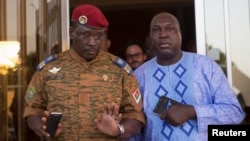A member of Burkina Faso’s civil society says the agreement on a plan for transitional government is a tribute to the citizens of the country who took to the streets to demand the ouster of President Blaise Compaore.
Issaka Traore, in charge of communication and information, praised the military for making concessions to the civilian population in the interest of the country.
This came after the country’s military, politicians, civil and religious groups Thursday approved an outline for a transitional government which would eventually lead to transfer of power from the military to a civilian-led government.
“We, the people of Burkina Faso, civil society organizations, political parties, traditional chiefs, community leaders and the army agreed on a charter for the transition to be led by a civilian who is not coming from the political parties but who is coming from the civil society,” he said.
Traore said once the interim leader is chosen, he will then appoint a Prime Minister who in turn will select a cabinet.
He said the plan also calls for the creation of a 90-seat transitional council which would play the role of a parliament.
“This National Transitional Council will be made up of 90 members – 30 members from the political parties, 25 members from the civil society organization, 25 members from the army and security staff, and 10 members from the ex-majority,” Traore said.
He said the arrangement also calls for reform of the Burkina Faso’s constitution and the creation of a national Truth and Reconciliation Commission.
Military leader Lieutenant Colonel Isaac Zida reportedly said the army made a number of concessions.
Traore said the different groups asked the military to think in the interest of the nation.
“We just asked them to take into consideration the interest of our country, the interest of our people because if there are any sanctions on Burkina Faso, it will not affect the army officials but the ordinary civilians. I think we should say today 'bravo' to the army of Burkina Faso,” he said.
The African Union had demanded that the military hand over power to a civilian-led administration within two weeks.
Traore said he believes the international community will accept the transitional plan because the groups overcame disagreements to arrive at the charter.
“Tomorrow we will be able to sign the charter and by signing the charter, it means we are going back to the rule of the constitution. And so there wouldn’t be any problem with the international community,” Traore said.





